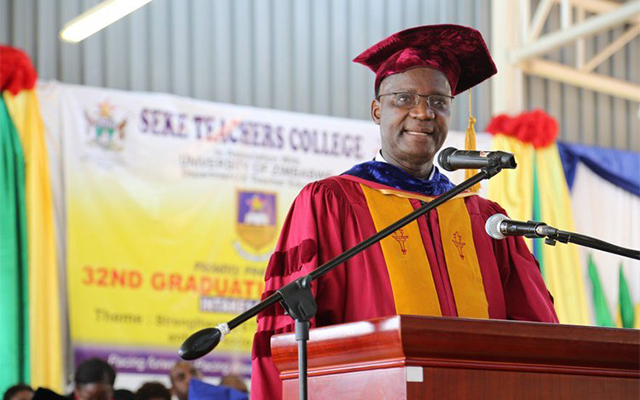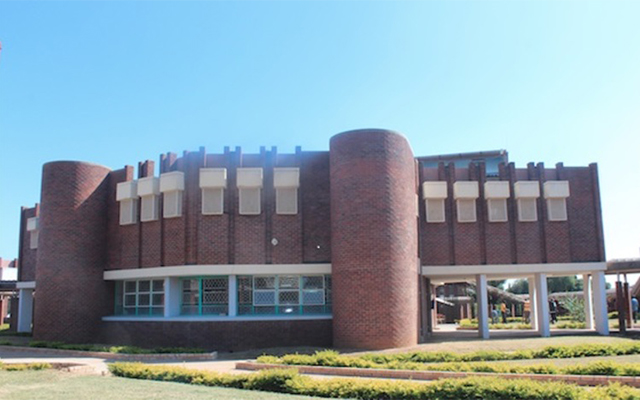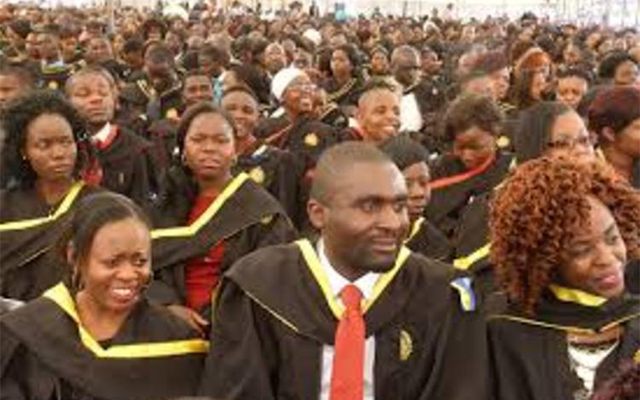Teachers colleges to become universities


Mkoba Teachers College will be the main university campus with a special mandate on teacher education
Stanely Mushava : Features Correspondent
“Renovations in progress” may well be the sign to permanently wave above the two education ministries. Both always seem to be in troubleshooting mode.Initiatives of sweeping consequence, Science, Technology, Engineering and Mathematics (STEM) and the curriculum review, are respectively transforming higher and basic education.And now, the Ministry of Higher and Tertiary Education, Science and Technology Development has gone a gear up with plans to convert teachers colleges and polytechnics into universities.
On September 19, the ministry announced that two committees have been put in place to assess the feasibility of the proposal and report back before the end of November.
If the committees file their homework in favour of the transformation, the ministry will get down to the task with “single-minded determination”.
It will be the end of an era for state-run colleges which have been in the game for close to a century.
Once started, the ministry will also urge churches to put their teacher training institutions under a similar overhaul.
“Two committees have been put in place to provide a comprehensive policy advisory and consultancy service to the ministry,” Higher and Tertiary Education, Science and Technology Development permanent secretary Dr Machivenyika Mapuranga said on Monday.
“For teachers colleges, a foundation committee will look into the transformation of all teachers colleges into a university of education with Mkoba Teachers College as the main university campus with a special mandate on teacher education.
“For polytechnics, a steering committee will make recommendations into whether polytechnics can be turned into degree-awarding institutions or can be standalone or can be one institution with eight campuses and propose a process for the transformation,” revealed the permanent secretary.
The seven-member steering committees for teachers’ colleges and polytechnics are respectively headed by Prof Chipo Dyanda and Prof David Simbi.
Their homework will include coming up with a structure for the proposed dispensation and breaking down its implications on staff qualifications, administration, infrastructure, staff development and government interventions.
The transformation is not an entirely new proposal but is set to undergo technical refinements in the aftermath of a consultative process conducted by the ministry between July 2015 and February 2016.
As reported in these columns previously, polytechnic colleges were already upgrading to degree-offering institutions over the past two years.
But instead of turning into universities, they were looking to continue offering the same technical programmes with a broader capacity and the authority to award degrees.
Higher and Tertiary Education, Science and Technology Development Minister Prof Jonathan Moyo had given his blessing and hinted that the colleges were likely to start offering degrees by the beginning of the 2018 academic year.
The expiry’s strategic plan last year, however, occasioned a new round of consultations where the idea came up again, only open-ended and subject to the recommendations to be submitted by the committees in November.
According to the permanent secretaries, the committees will put to test the feasibility of different options including a scenario whereby colleges will offer degrees as stand-alone institutions with the capacity to offer at least four degree specialisations.
Another option will be to make the colleges regional campuses, with one that already has the required structure becoming the main university campus.
Currently, teachers colleges and polytechnics have schemes of association with the University of Zimbabwe (UZ) and the National University of Science and Technology (Nust).
The committees will also consider maintaining the arrangement while opening up new partnerships with other universities which already have faculties of education or engineering.
Churches, for decades key development partner in the education sector, will be a naturally ally for the revolution being plotted.
“The committees will consider enabling church-run teachers colleges to enter into new schemes of association with their corresponding church-related universities, or even become faculties or colleges of these institutions,” said the permanent secretary.
Minister Moyo said the proposal to transform colleges into degree-offering institutions is “a clear message that STEM is not a jingle”.
He pointed out that his ministry was following up on national and regional development imperatives, with a view of making education the control room of industrialisation and modernisation.
“This is a significant development in line with His Excellency President Robert Mugabe’s policy charge that our nation must industrialise and modernise,” said Prof Moyo.
“It is in line with the SADC development strategy and African Union’s Agenda 2063, adopted when His Excellency was the chairperson. We are also doing so and doing this in line with the Manpower Development Act which mandates us to train, plan and develop manpower,” he said.
He said the ministry is looking to take advantage of its position as one of the most literate African countries.
“Zimbabwe enjoys an unmatched reputation in terms of basic education. We want to make sure that higher and tertiary education benefits from that,” Prof Moyo said.
The minister observed that what teachers’ colleges and polytechnics are already offering is already relevant but there was need to align it to changing policy and the operating environment.
“We must see what the emerging in industry, commerce and the public sector requirements are and design degrees programmes accordingly,” he said.
In a previous Herald Review installment, Minister Moyo said the tailoring new degrees will encourage creative responses to technological and engineering gaps, promote entrepreneurship and help revive the country’s industries as outlined in the country’s economic blueprint, Zim-Asset.
Harare Polytechnic College principal Engineer Tafadzwa Mudondo said the degrees to be offered by the colleges are expected to be distinct from those being offered by universities, drawing on the traditional strengths of the colleges while corresponding to emerging economic needs.

The Ministry of Higher and Tertiary Education, Science and Technology Development has gone a gear up with plans to convert teachers colleges and polytechnics into universities
“The distinction which we should note is that the old type of students which were being produced were a straight-jacket type of graduate who may be specifically qualified to do maintenance work.
“The graduates would have a repair-and-maintenance philosophy such that once circumstances changed, they would fail to change to the dictates of the given environment.
“We are going to be producing dynamic, responsive graduates able to be adaptive in evolving environments,” Eng Mudondo said.
He lamented a situation whereby students would have earned national certificates, national diplomas and higher national diplomas being bottlenecked out of industry and forced by universities to start afresh.
Economic giants such as US, China and Australia have greatly capitalised on polytechnics that offer degrees and Zimbabwe wants to take that course, first though, by upgrading content.
Feedback: [email protected]











Comments